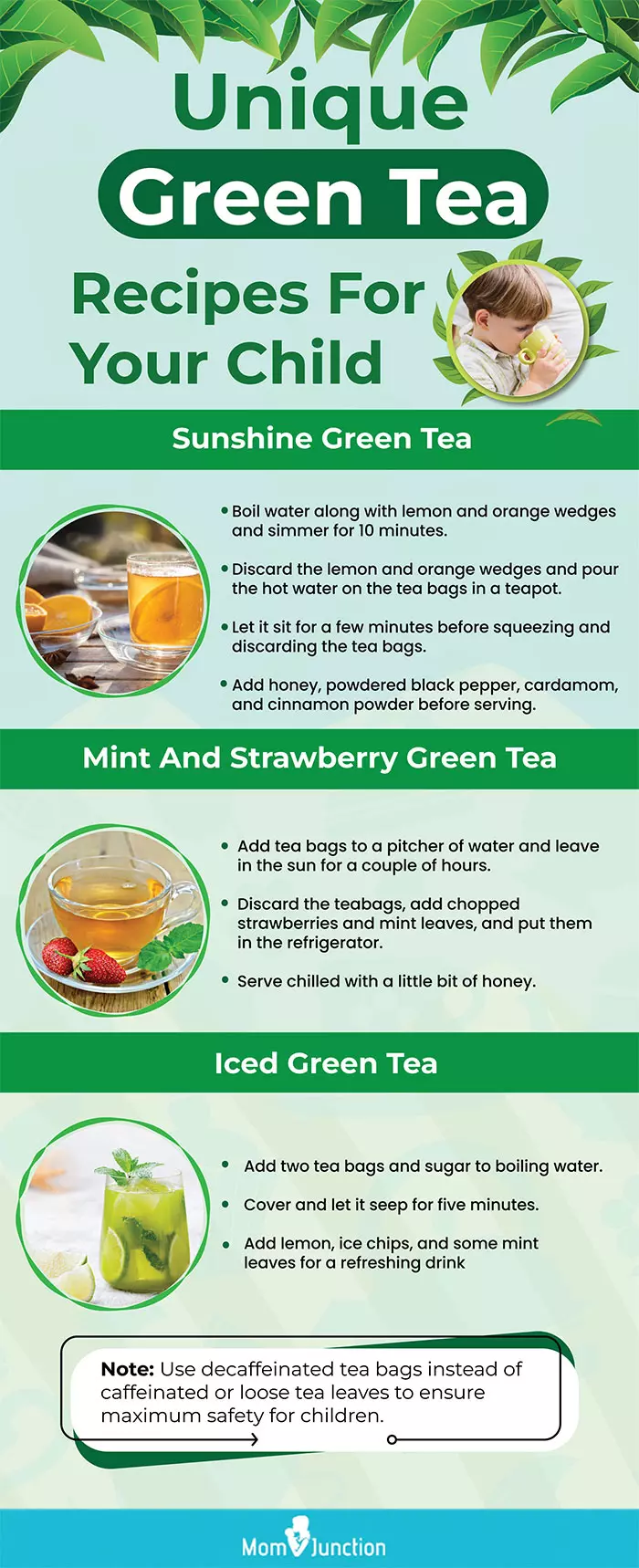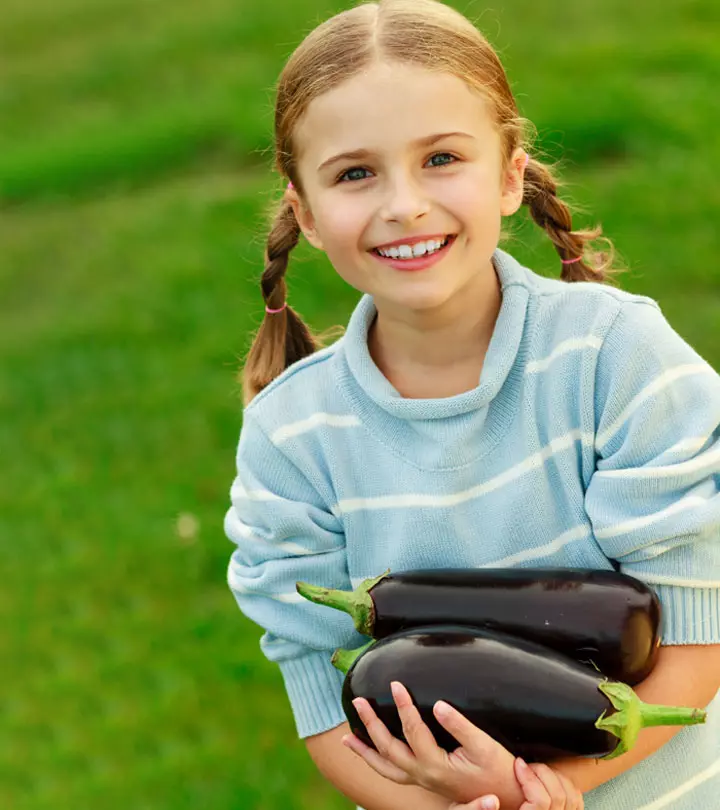
Image: ShutterStock
Green tea is a refreshing and popular beverage that is a favorite among many people due to the health benefits it offers. However, if you are unsure about the benefits and side effects of green tea for children, we will help you find the answers in this post.
Green tea has been scientifically proven to aid weight loss, improve cardiovascular health, and improve mental alertness. In addition, the high amount of antioxidantsiChemicals that protect your body from free radicals present in green tea may help strengthen children’s immunity , prevent signs of cold and flu. This article will provide you with a comprehensive look at the benefits and side effects, helping you make informed decisions regarding your child’s diet.
Key Pointers
- Green tea contains caffeine, antioxidants, theanine, and catechin.
- Green tea provides health benefits for adults such as cancer prevention, cardiovascular health, and mental agility.
- Green tea helps children by providing energy, fighting influenza, and reducing the risk of developing a cavity.
- Excessive green tea consumption in children may lead to sleep problems, headaches, diarrhea, anemia, and hyperactivity.
- Green tea may interfere with medications and cause bone damage.
What Is Green Tea?

You can brew tasty green tea by boiling the leaves of the Camellia sinensis plant in hot water. Sometimes, green tea extract is also used in alternative medicine.
Some of the health benefits that green tea consumers attribute to the beverage are:
- Drinking green tea improves cardiovascular health as it helps and low blood pressure (1).
- It is rich in antioxidants and helps to prevent various types of cancer, like endometrial canceriCancer that starts in the inner lining of the uterus. and ovarian cancer.
- Regular and prolonged intake of green tea can improve bone density in menopausal women and prevent osteoporosisiA condition that weakens bones, increasing the chance of sudden, unsuspected bone fractures. .
- Green tea also helps prevent Parkinson’s diseaseiAn age-related degenerative brain condition that leads to uncontrollable movements. .
It is important to note that excessive intake of green tea for your child can also have negative effects.
The Side Effects Of Serving Green Tea For Kids
Green tea is a proven ‘healthy’ beverage for adults. Research is yet to prove how green tea can boost the health of children hence most doctors do not recommend it.
Here are some side effects of green tea that you should consider before giving it to your children:
- Green tea contains caffeine, and its excessive consumption can cause hyperactivity, headache, sleep problems, vomiting, diarrhea, irritability, irregular heartbeat, tremor, heartburn, dizziness, convulsionsia condition in which the body shakes uncontrollably due to muscles that contract and relax fast. , and confusion (1).
- According to the World Health Organisation (WHO), anemia is estimated to impact about 39.8% of children worldwide between six and 59 months. Green tea adversely affects the absorption of iron from food and may cause anemia in your growing child (2).
- Drinking green tea can interfere with certain medications and can cause negative reactions (1).
- Green tea consumption can weaken the bones of your kid as it increases the amount of calcium flushed out from his body in urine.

- Your kid may develop a food allergy after consuming green tea.
- Drinking green tea can reduce his body’s absorption of thiamineiCommonly known as vitamin B1, responsible for the growth, development, and function of various cells . A deficiency of thiamine in the body can cause Beriberi. It is a disorder of the nervous system and can cause weakness in your kid’s limbs, impairment of his sensory perceptions, irregularity in his heart rate and more.
- Green tea also contains a very high amount of oxalic acid and can lead to the formation of kidney stones.
- If your kid has IBS concerns, it may worsen diarrhea and IBS (Irritable Bowel SyndromeiA disorder that causes discomfort in the stomach and intestines. ) symptoms.
Hence, it is important for parents to closely monitor their child’s reactions to green tea and notice any changes in their health. Maintaining a log of consumption and effects enables parents to better understand individual tolerances.
 Point to consider
Point to considerBenefits Of Giving Green Tea To Kids
Sometimes, giving green tea to children may work wonders for them in the following ways:
- You may give your kid a little green tea if you feel they are always tired and lack energy. Make sure you watch out for any food allergy. If they seem energetic and happy, you may give them a small quantity of green tea the next day as well.
- Green tea contains the compounds catechin and amino acid theanine. Drinking green tea on an average of five cups a week could help them fight off influenzaiA widespread viral infection, particularly in high-risk populations, and has the potential to be fatal. . Honey can be added to warm green tea for additional benefits.

- Having green tea may reduce his chances of developing a cavity and bad breath as it contains catechin that works against these (1). Add lemon to your green tea for its antibacterial properties. Remember that there is no adequate research to back this claim yet.
 Quick fact
Quick factFrequently Asked Questions
1. What is the healthiest green tea?
Matcha, a type of green tea, may be considered the healthiest, offering many benefits such as rapid fat burning, increasing energy, and better skin health. Additionally, it also helps in boosting one’s digestion (3). Organic green tea is believed to contain more natural antioxidants than conventional green tea.
2. Is green tea better than milk tea?
Green tea contains polyphenolsiSecondary plant metabolites frequently used in pathogen resistance and UV light defense. which help reduce the risks of cancer, chronic diseases, and stroke (4). Whereas adding milk to teas has been found to reduce teas’ beneficial polyphenol and antioxidant content. Therefore adding the right amount of milk and drinking it in moderation may help curtail these effects (5).
3. When can my child start drinking tea?
Experts do not recommend tea for kids and teens (6). However, you can ask your pediatrician or a nutritionist if you wish to give tea to your child.
4. What tea is safe for children?
Certain herbal teas, such as lemon balm or chamomile tea, may provide some health benefits to children For instance, lavender tea has a calming effect on the nervous system (7). However, it is best to give such teas to your child only after you talk with your pediatrician.
5. Are herbal teas a better alternative for kids?
Herbal teas, such as chamomile or peppermint, are considered relatively safer for children as they do not contain caffeine or additional sugar and provide various health benefits. However, it is always best to consult a healthcare professional before introducing new teas to your child’s diet.
Green tea is helpful to adults when consumed in moderation, but its effect on children is yet to be demonstrated. While green tea for children can provide them with energy and help them against influenza, cavities, and bad breath, it also contains caffeine and oxalic acid, which can be harmful to kids. It can also have a negative impact on iron absorption from meals, cause a food allergy, interact with some drugs, and cause IBS in kids, among other concerns. Therefore, it’s best to see a doctor before giving your child green tea.
Infographic: Interesting Green Tea Recipes For Children
If you offer your children green tea occasionally, the recipes in the infographic below can come in handy. They can be enjoyed by children and adults alike. You may tweak some ingredients in these recipes to suit your child’s palate. Illustration: Momjunction Design Team
Illustration: Green Tea For Children – Health Benefits And Side Effects

Image: Dall·E/MomJunction Design Team
References:
- Green Tea Extract.
https://www.stanfordchildrens.org/en/topic/default?id=green-tea-extract-19-GreenTeaExtract - Frank S Fan; (2016); Iron deficiency anemia due to excessive green tea drinking
https://pmc.ncbi.nlm.nih.gov/articles/PMC5093162/ - Patrick Van Negri explains benefits of matcha green tea
https://world.edu/patrick-van-negri-explains-benefits-of-matcha-green-tea/ - Sabu M Chacko et al. (2010); Beneficial effects of green tea: A literature review
https://pmc.ncbi.nlm.nih.gov/articles/PMC2855614/#:~:text=Green%20tea%20contains%20polyphenols%2C%20whichflavonols%2C%20commonly%20known%20as%20catechins. - Tea
https://nutritionsource.hsph.harvard.edu/food-features/tea/ - Caffeine and Kids
https://www.cuimc.columbia.edu/news/caffeine-and-kids#:~:text=How%20much%20caffeine%20can%20kids - Healing Through Wholeness
https://hsc.unm.edu/news/news/healing-through-wholeness.html
Community Experiences
Join the conversation and become a part of our nurturing community! Share your stories, experiences, and insights to connect with fellow parents.
Read full bio of Shivani Sikri
Read full bio of Debolina Raja
Read full bio of Swati Patwal
Read full bio of Shinta Liz Sunny

















